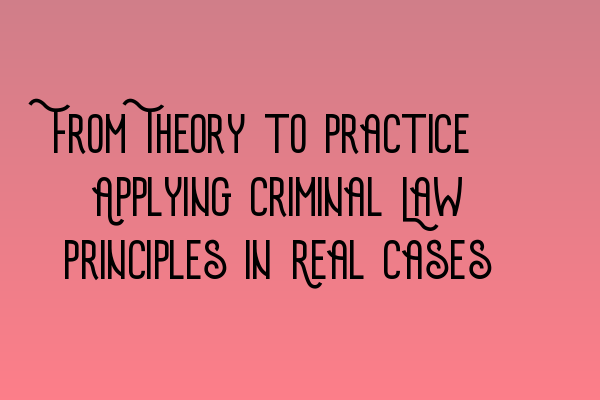From Theory to Practice: Applying Criminal Law Principles in Real Cases
Understanding criminal law principles is essential for every aspiring criminal lawyer. While studying the theoretical aspects of criminal law is important, the true test lies in the application of these principles in real cases. In this blog post, we will delve into the practical side of criminal law, exploring how these principles are utilized in real-life scenarios.
The Role of a Criminal Lawyer
Before we begin, let’s have a quick overview of the role of a criminal lawyer. A criminal lawyer represents individuals or organizations facing criminal charges. They ensure that their clients’ rights are protected throughout the legal process, gathering evidence, preparing defenses, and advocating on their behalf in court.
Building a Strong Defense Strategy
When a criminal lawyer takes on a new case, their first task is to build a strong defense strategy. This involves analyzing the evidence provided by the prosecution, identifying any weaknesses or inconsistencies, and crafting a defense that best protects their client’s interests.
One crucial principle in criminal law is the presumption of innocence. A skilled criminal lawyer must work diligently to establish reasonable doubt in the minds of the jury or judge. They may utilize various strategies, such as cross-examining witnesses, challenging the admissibility of evidence, or presenting alternative explanations for the alleged crime.
To further strengthen their case, criminal lawyers may also draw on legal precedents and statutes. By referencing previous cases with similar circumstances, they can argue for favorable interpretations of the law that support their client’s innocence or a reduced sentence.
Engaging in Negotiations and Plea Bargaining
Another essential aspect of criminal law practice is engaging in negotiations and plea bargaining. Sometimes, it may be in the best interests of the defendant to negotiate a plea deal with the prosecution. This involves reaching an agreement where the defendant pleads guilty to a lesser charge or receives a more lenient sentence in exchange for avoiding a trial.
Criminal lawyers must carefully evaluate the strength of the prosecution’s case and weigh the potential outcomes of a trial before advising their clients on whether to accept a plea bargain. They must also consider the individual circumstances of their clients, including their criminal history, personal situation, and potential collateral consequences of a trial.
Adapting to Changing Legal Landscapes
With criminal law constantly evolving, criminal lawyers must stay updated on legal changes and adapt their practice accordingly. They need to be aware of recent court decisions, changes in legislation, and emerging legal trends that may impact their clients’ cases.
Continuous professional development is crucial for criminal lawyers. This involves attending seminars, workshops, and training courses that provide insights into new developments in criminal law. SQE 1 Practice Exam Questions and SQE 1 Practice Mocks FLK1 FLK2 are useful resources for aspiring criminal lawyers to sharpen their skills and stay updated with the current legal landscape.
Furthermore, preparing for the Solicitors Qualifying Examination (SQE) is an essential step for individuals seeking to become qualified criminal lawyers in the UK. SQE 2 Preparation Courses and SQE 1 Preparation Courses are available to aid aspiring lawyers in their journey towards becoming qualified solicitors.
The Rewards of Practicing Criminal Law
Despite the challenges, the practice of criminal law can be highly rewarding. Criminal lawyers have the power to protect individuals’ constitutional rights, fight for justice, and make a positive impact on society. The ability to apply criminal law principles effectively, backed by a strong defense strategy, can often lead to favorable outcomes for their clients.
In conclusion, criminal law goes beyond theoretical understanding; its true essence lies in the practical application of principles in real cases. Skillful criminal lawyers build robust defense strategies, engage in negotiations and plea bargaining, and adapt to changing legal landscapes. By mastering these practical aspects, lawyers can make a significant difference in the lives of their clients.
To stay updated with the latest SRA SQE Exam Dates and to access invaluable resources for SQE preparation, visit SQE 1 Practice Exam Questions, SQE 1 Practice Mocks FLK1 FLK2, SQE 2 Preparation Courses, and SQE 1 Preparation Courses.
